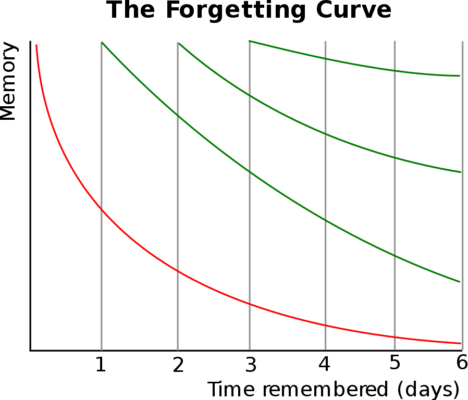Improve Your Memory
It can be frustrating to spend hours learning something and then forgetting everything about it after only a week. Unfortunately, this is what your brain does, especially if you have only read or heard the material once. In this very short article, you will get introduced to some of the key concepts that will help you improve your memory.
How much of the material that you learnt in school do you remember? Most people can safely say that they have forgotten the great majority of it.
It's important that you are aware of this: You are not born with a good or a bad memory. Memory is a skilled that can be learnt, and what usually separates someone with a "good memory" from someone with a "bad memory" is how they mentally organise new knowledge.
If you think you have a bad memory and would like to improve it, you have come to the right place. In order to start memorising more, you probably need to change the way you think about new knowledge.
In this section, we are going to look at some tools and tricks you can use so that you can start remembering what you learn instead of letting it slowly die from your memory.
We are going to jump straight in and start talking about one of the most important factors when it comes to memorisation, and that is regular repetition. If you don't use what you have learnt for anything or review it, your brain will assume that it's of no importance to you and not do anything to keep it in your memory.
The reason why you do not remember things without repetition
When you learn something new, it goes into your short term memory. It is then forgotten shortly after learning it because the brain doesn’t regard it as important. It regards it as having no value because you haven’t used it for anything after you learnt it. To remember something you need to tell your brain that it is important by repeating the material. By repeating it regularly you tell your brain that it is worth remembering, and as a result, it is placed in your long term memory. It makes sense: of course your brain thinks that it is important because you are actually using the material. By using it with regular intervals, you tell your brain that you are likely to use it in the future as well, so it has no choice but to remember it.
Spaced Repetition
Spaced Repetition is a memorisation technique based on progressively increasing the time between each time you review the material you are learning. Repetition is essential if you expect to remember something long term, and spaced repetition is one of the most successful structured repetition systems for this purpose.
Spaced repetition has been tested by psychologists and has proven to be more successful than repeating previously learned material at random intervals. This is because you take advantage of your brain’s psychological spacing effect and involves reviewing the material at the point when you are about to forget it.
This technique stems from the work of the psychologist Hermann Ebbinghaus. He developed something we today call the forgetting curve. This is a graph that shows that each time we actively recall the same information, it takes longer for it to decay from our memory.

In my opinion, the best way to start taking advantage of Spaced Repetition is with an app such as Anki. This app will automatically space out the time intervals for you, based on how well you remember the information you are reviewing.
Click here for a short explanation of how to use Anki.
Other tips to improve your memory
Here is a list of tips you should consider using next time you are learning something:
- If you are reading a text, concentrate on the key points. Don't focus on learning the details.
- Use mind maps. Mindmaps are a fantastic tool for memorisation - especially if you use colours strategically. I would recommend checking Out Tony Buzan's work on mindmaps if you are interested in really taking advantage of the power of mindmaps.
- Try to understand what you are learning. Explain in your own words what the main points of the material were after having read it.
- If you read something, record it and listen to it afterwards. That way you have received the material both visually and aurally.
- Build your own mind palace.
- Check out this article for a great memorisation technique you can start using straight away.
Image credits:
https://commons.wikimedia.org/wiki/File:ForgettingCurve.svg
